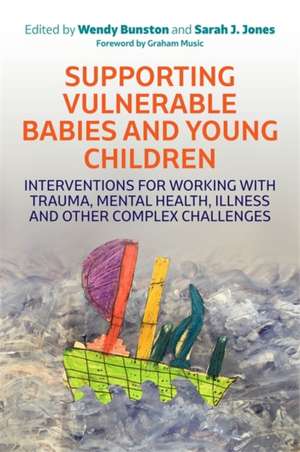Supporting Vulnerable Babies and Young Children
Editat de Wendy Bunston, Sarah Jonesen Limba Engleză Paperback – 18 sep 2019
It outlines relevant theory and good practice, gathering case examples from around the world to illustrate what interventions look like in direct practice. Leading contributors address a wide range of challenges, including babies and very young children who have a serious illness, have complex diagnoses, or have been exposed to violence or adversity in early childhood. This is an essential guide for those who work to support and safeguard the welfare of babies and very young children, including professionals in health care, social work, mental health and child protection settings, as well as paediatricians, child psychologists and child psychiatrists.
Preț: 212.02 lei
Preț vechi: 267.40 lei
-21% Nou
Puncte Express: 318
Preț estimativ în valută:
40.58€ • 42.80$ • 33.91£
40.58€ • 42.80$ • 33.91£
Carte disponibilă
Livrare economică 10-24 decembrie
Livrare express 26-30 noiembrie pentru 85.31 lei
Preluare comenzi: 021 569.72.76
Specificații
ISBN-13: 9781785923708
ISBN-10: 1785923706
Pagini: 312
Ilustrații: 20 line drawings/figures
Dimensiuni: 152 x 228 x 20 mm
Greutate: 0.45 kg
Editura: JESSICA KINGSLEY PUBLISHERS
ISBN-10: 1785923706
Pagini: 312
Ilustrații: 20 line drawings/figures
Dimensiuni: 152 x 228 x 20 mm
Greutate: 0.45 kg
Editura: JESSICA KINGSLEY PUBLISHERS
Cuprins
1. Introducing the Infant: And how to support vulnerable babies and young children by Wendy Bunston & Sarah J Jones. 2. Reflective Supervision's Essential Place in Thoughtful Practice by Julie Stone (Infant, Child and Family Psychiatrist), Sarah J Jones and Wendy Bunston. 3. Restoring Ruptured Bonds: The Young Child and Complex Trauma in Families by Fiona True (Social Worker and Family Therapist, Member of the Teaching Faculty and Co-Director of the Center for Children and Relational Trauma, Ackerman Institute for the Family, New York). 4. Developing an Intervention for Infants and Young Children in Foster Care: Watch Me Play! by Jenifer Wakelyn (Child Psychotherapist, London). 5. Keeping the Child in Mind when thinking about Violence in Families by Angelique Jenney (Social Worker, Director of Family Violence Services for Child Development Institute, Toronto). 6. 'Murder in their Family': Making space for the experience of the infant impacted by familial murder by Kathy Eyre (Senior Occupational Therapist/Family Therapist, Melbourne's Royal Children's Hospital Mental Health Service), Nicole Milburn (Clinical Psychologist and infant mental health specialist) and Wendy Bunston. 7. Homelessness in Infancy: Finding 'home' for babies in crisis accommodation after family violence by Wendy Bunston. 8. Self-Determining Support for Indigenous Children in Australia: The Bubup Wilam case study by Angie Zerella (Education and Training Manager at Bubup Wilam for Early Aboriginal Child and Family Centre), Lisa Thorpe (proud Gunditjmara/Gunnai woman and current CEO of Bubup Wilam for Early Learning Aboriginal Child and Family Centre), Luella Monson-Wilbraham (Executive Officer for First 1000 Days Australia) and Kerry Arabena (Meriam woman, consultant, business owner and former Chair for Indigenous Health, University of Melbourne). 9. Infants and Young Children in the Aftermath of the Great East Japan Earthquake, Tsunami and Fukushima Daiichi Nuclear Power Plant Accident by Hisako Watanabe (Tokyo, Japan, Previous Director of Division of Infant, Child and Adolescent Mental Health and Assistant Professor at the Department of Pediatrics). 10. Play with us: Bringing hope and healing to Kwazulu-Natal's children by Rachel Rozentals-Thresher (Dlalanathi's Director since 2007), Robyn Hemmens (has worked in the children's sector in South Africa since the 80's) and Julie Stone (Infant, Child & Perinatal Psychiatrist, Gippsland, Victoria and Founding Director of the Uthando Project, working for the children of Kwa-Zulu Natal, South Africa). 11. The 'International Infant': Examining the experiences and clinical needs of separated and reunited transnational infant-parent dyads: An essay by Natasha Whitfield (Clinical Psychologist, Ontario). 12. 'Invisible Children? How attachment theory and evidenced-based procedures can bring to light the hidden experience of children at risk from their parents by Ben Grey (Senior Lecturer in Attachment Studies at the University of Roehampton) and Jeremy Gunson (Child & Adolescent Psychotherapist working in the NHS, Birmingham). 13. Infants and Young Children Living within High Conflict Parental Disputes: "Keep me safe and organise my emotional world" An Interview with Professor Jennifer McIntosh (Clinical Psychologist, Professor of Attachment Studies at Deakin University) by Sarah J Jones. 14. Playing behind the Barbed-Wire Fence: Asylum-seeking infants and their parents by Christine Hill (Maternal Child Health Nurse and Infant Psychotherapist, Melbourne, Australia). 15. Infants with Cancer: The oncology unit as their second home by Maria McCarthy (Academic Researcher, Family Therapist, Melbourne) and Helen Shoemark (Associate Professor of Music Therapy at Temple University, Philadelphia) & Addendum: A mother's perspective. 16. High-Risk Infant Mental Health Outreach: Creating a professional community of caregivers using a collaborative mental health and nursing approach by Paul Robertson (Child and Adolescent Psychiatrist), Amity McSwan (Accredited mental health social worker and trained family therapist, Victoria), Louise Dockery (Registered Nurse, Registered Midfwife and Maternal and Child Health Nurse, Victoria). 17. The Art of Finding Authentic Discourses for Parents about and with their Donor Conceived Children by Sarah J Jones.
Descriere
A ground-breaking text that gathers together effective ways of working with complex or emerging practice issues when supporting vulnerable babies and young children. It explores a wide range of issues, from complex health needs through to trauma, mental health and adverse life experiences.
